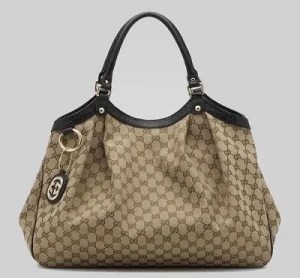Over the last two blog posts (see here and here) we have discussed various aspects of trademark law including the requirements for obtaining a trademark. If you recall, to obtain a trademark, the seeker must show that the graphics/artwork, word, slogan, or phrase meets the distinctiveness requirement which is similar to the originality requirement in copyright law. To satisfy the distinctiveness requirement, the graphics/artwork, word, slogan, or phrase must be more than a “generic” term or image. This is why the trademark of the term “travel care” was successfully challenged in the Remington Products, Inc. v. N. Am. Philips Corp case–the court found that the term “travel care” was so commonly used and widely known that it had fallen into the public domain. Furthermore, the court found that Philips Corp. had not established a secondary meaning for the term (which would have supported the finding of a trademark.)
Counselor, what if...

Let’s Discuss Gucci America, Inc. v. Guess?

Based on the facts you present, the primary question is whether you intended to copy your competitor’s mark onto your merchandise. From what you have told me, it does not appear that you actually copied her mark, but incorporated her mark into your own mark. If this is the case, and consumers are not likely to mistake your products for hers, you have a strong case to continue to sell your hats. Of course, the Gucci case and trademark issue are much more complex than these two issues, but the fact that you appear to have satisfied them favorably definitely works in your favor.
Send us your thoughts at info@thehollywoodlawyer.com or tweet us at @thehollywoodlaw. You can also find us on Facebook: www.facebook.com/thehollywoodlawyer or Google +: https://plus.google.com/+ThehollywoodlawyerinLA and post your comments there.
—————————————————————————————————————————–
Disclaimer: Please note that the information contained within this blog post and site is offered simply as a consideration to visitors who are in the entertainment industry and are seeking to learn more about various areas of entertainment, be it in film, movies, television, music, digital, new media, film financing, merchandising and/or branding. As such, the information so provided should never be construed as legal advice. If you need further assistance or legal advice for your specific matter, please do not hesitate in contacting an entertainment attorney (film, music, digital, licensing, financing) here in Los Angeles, California at The Hollywood Lawyer by(1) emailing us at info@hollywoodlawyer.com; (2) calling us at (323) 300-4184; or (3) filling out our online form.





